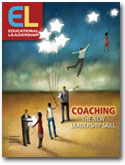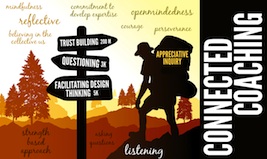The back story
 The October 2011 edition of ASCD’s Educational Leadership recognizes coaching in education as “the new leadership skill” — and features more than a dozen articles by practitioners and leading experts, including Bob and Megan Tschannen-Moran, Jim Knight and Elizabeth City. All in all, it’s a great issue — a power-packed resource that addresses most any traditional coaching context you might imagine.
The October 2011 edition of ASCD’s Educational Leadership recognizes coaching in education as “the new leadership skill” — and features more than a dozen articles by practitioners and leading experts, including Bob and Megan Tschannen-Moran, Jim Knight and Elizabeth City. All in all, it’s a great issue — a power-packed resource that addresses most any traditional coaching context you might imagine.
Which may explain why the article I submitted with my writing colleague Lani Ritter-Hall was returned with a gracious “no thanks.” It looks at coaching in a very non-traditional setting: virtual space.
Our draft submission, “Connected Coaches in Connected Spaces,” reports on the development of a new kind of coaching model, specifically designed to promote higher levels of collaboration and learning among educator teams in our Powerful Learning Practice virtual communities. The first coaches trained in this model are now practicing their new skills in live PLP communities during the 2011-12 school year.
The skinny
Using a strength-based, appreciative inquiry approach, our connected coaches lead members of our online communities through a process that results in a shared vision of new ways of learning together in online spaces. The coaches work to increase the confidence and self-efficacy of individual team members. They also work to create learning experiences that demonstrate ways that teamwork is necessary to grow as connected learners.
A Connected Coach guides participants toward collegial interaction by helping build a bridge from the theory they are hearing to practical application. Our experience has shown us that just creating an understanding of how we learn in networks and communities is not enough to generate a deep commitment to sharing and collective knowledge building — the kind of growth that results in innovative school improvement. Connected Coaches, through various activities and discussions, help participants create connections to the content and context, to themselves, and to those who are part of the learning community at school and online.
The edgy part
 Although our Connected Coaching model draws strongly from Evocative Coaching (Tschannen-Moran & Tschannen-Moran, 2010), Cognitive Coaching (Costa & Garmston,1994), Appreciative Inquiry (Cooperrider & Whitney, 2005), the work of Jim Knight, and our own Solution Tree book The Connected Educator (Nussbaum-Beach & Ritter-Hall, 2011), we acknowledge that the model may feel a little edgy or unstructured, especially to those who have not — as we have — spent countless hours learning and leading in virtual professional communities of various sizes, structures and purposes.
Although our Connected Coaching model draws strongly from Evocative Coaching (Tschannen-Moran & Tschannen-Moran, 2010), Cognitive Coaching (Costa & Garmston,1994), Appreciative Inquiry (Cooperrider & Whitney, 2005), the work of Jim Knight, and our own Solution Tree book The Connected Educator (Nussbaum-Beach & Ritter-Hall, 2011), we acknowledge that the model may feel a little edgy or unstructured, especially to those who have not — as we have — spent countless hours learning and leading in virtual professional communities of various sizes, structures and purposes.
We ask our connected coaches to engage in what we call wayfinding, a term we feel is appropriate to the learning that occurs in connected spaces, and we set out pathmarkers to guide them in their role as coaches.
Since we believe this coaching journey is as much an art as it may be a science, we intentionally unnumber the pathmarkers and suggest the process is not prescriptive. We indicate to our coaches that there may be detours; there may be a need to loop back and revisit as they engage in listening, paraphrasing, and asking good questions. We remind them as they wind their way through trust building, questioning and facilitating design-thinking to always be mindful of celebrating progress.
We intend that these markers (which we identify in the article) illuminate the way as coaches facilitate the journey of others toward a more accomplished reflective practice that is as much self-directed as it is collaborative — always with the goal of creating momentum for purposeful inquiry around a shared vision of self and school improvement.
Since ASCD has chosen to recognize coaching as a leadership skill this October — and to provide many useful resources to advance the cause of coaching — we thought we’d share one that got away.
Download “Connected Coaching in Connected Spaces”
And we’d love to hear what you think about the potential usefulness of coaches following this model in virtual learning communities.
Latest posts by Sheryl Nussbaum-Beach (see all)
- “We have done this before, we can do it again.” - October 15, 2020
- Are you Remote Learning or Connected Learning? - October 6, 2020
- Passion Based Learning: Personalize Your Blended Curriculum - September 4, 2020


Trackbacks/Pingbacks